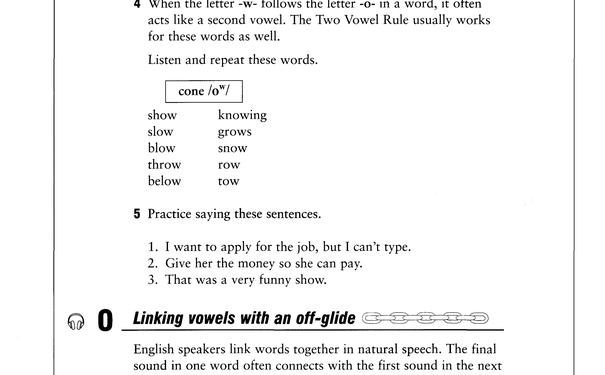一、英语里重读的只有元音吗?
是的, 观察下就会发现,重读都发生在元音上。
一般只有两个已经两个元音以上的单词才会有重读。二、英语句子中需要重读的实词有多少个?
名词、动词、形容词、副词、数词、代词等.不重读的多为虚词,比如,冠词、连词、介词、感叹词等.
三、英语中重音怎么找?
首先要明确重音位置,重音是音标中带小撇的那个地方。
其次,用描述的方法来教你怎么读,不容易学会。我建议你去找个在线词典,查几个单词,english,begin,international.,听词典的读音,注意体会这三个词重音的不同,分别在最前,第二和第三。你基本掌握之后,遇到类似的单词就套着那个调来读,基本可以学会了。
四、朗读英语句子时,哪些需要重读,哪些需要非重读?
重音
2、句子重音
A) 英语的节奏:(轻)-轻-重-轻-(轻)或重-轻-(轻)(轻)重
B) 英语句子的长短:是由句子中的重读词的数目决定的,而不是象汉语那样由句子中的汉字数目决定的。
C) 实词重读(副词重读),虚词轻读(冠词,单音节介词,单音节连词,人称代词,反代词,物主代词,关系代词,相互代词,助动词,情态动词和系动词be
D) 实词不重读的特殊情况
a) 实词第二次出现 He thinks of that as a child thinks.
b)一个名词被第二个名词修饰 I met her in the railway station.
c) 代替词 Which book do you want? The small one.
d)感叹词中的 what 和how What a good day it is! How beautiful she is!
e) street 在专有名词中 Wangfujing Street.
f)this在这些短语中,this morning/afternoon/evening
E)虚词重读的特殊情况
a) 情态动词,助动词和系动词be在句首,句尾和否定时。
Do you like it? Yes, I do. Are you a doctor? Yes, I am. Can you help me? Yes, I can.I don't like you. He isn't a worker.
b) 情态动词表示可能,惊奇和肯定时。They may come this evening. Can it be five already? He must be in the room.
c) 介词在句首和句尾。In the box, he found a letter. He is the person I talked with.
d) 引导复合句的连词在句首。If you wish, I'll visit you. When he comes, I'll tell him.
e)反身代词表示强调。He couldn't come himself.
1、单词重音
A)双音节词
a)一般在第一个音节重读。letter, sorry
b)有 a-, be-, de-, re-, res-, in-, im-, en-, em-, es-, ex-, con-, com-, dis-, mis-, pre-, per-, pro-, trans- 等前缀的词,第二个音节是重音。
a'bout, be'lieve, ad'dress, de'cide, re'port, con'demn, res'pect, com'pare, in'form, dis'cuss,im'press, mis'take, en'force, pre'pare, em'ploy, per'mit, es'cape, pro'duce, ex'claim,trans'late
c)有 de-, in-, re-, con-, pre-等前缀的重音与词义和词类有关, 一般名词的重音在第一个音节上,其它的词性在第二个音节上。
'record, re'cord; 'insult, in'sult; 'conduct, con'duct; 'present pre'sent; 'content, con'tent
d)有些复合词和带有前缀 re-, ex-, un-, pre-, post-, 等的词,有两个重音。'out'side, 're'tell, 'well-'known, 'un'real, 'fif'teen, 'Chi'nese, 'pre-'war, 'post-'war
B)多音节词
a)一般倒数第三个音节是重音。'difficult, 'communist, 'family, e'conomy, oppor'tunity,de'mocracy.
b)有一些双音节词,加了前缀和后缀成了多音节,但这些词按原来词根的重音读音。'carefully, in'definite, 'comfortable, con'ductor, ac'cording, dis'turbance, 'complicated,es'tablishment,
c)词尾有-eous, -grahpy, -ial, -ian, -ic, -ics, -ience, ient, -ify, -ion, -ious, -ity, ive 后缀的词,重音在这些后缀的前一个音节上。
cour'teous, cal'ligraphy, edi'torial, his'torian, peri'odic, mathe'matics, ex'perience,suf'ficient, i'dentify, trans'lation, re'ligious, curi'osity, pro'tective
d)词尾有 -ain, -ee, -eer, -ese, -ette 后缀的词,重音在该后缀上,而且有一个次重音。enter'tain, emplo'yee, mountai'neer, Japa'nese, ciga'rette
五、一个英语句子几个重读?
一个句子可以有许多重音,自己根据要表达的意思来读,重读的地方往往是强调的重点
如:I can't finish this job
重音可以是这个句子的每个部分
I强调是我,而不是你
can't强调不会
finish强调完成
this强调是这份工作,而不是其他的工作
job强调工作

